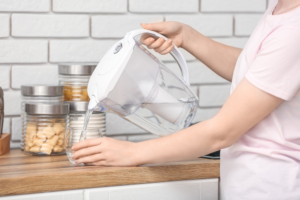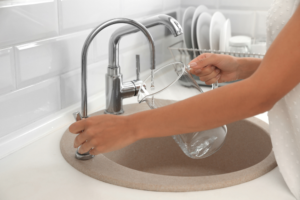Water filters have become an increasingly popular appliance with many people choosing to install water filter systems in their homes. There are a number of different systems to choose from so figuring out where to start can be tough. In this guide, we break down the different types of water filter systems and some popular brands.
What is a water filter?
Water filters are devices used to filter out particular unwanted qualities in drinking water. Different types of filters can filter out different kinds of contaminants, with ion-exchange resins able to remove poisonous and heavy metal ions (e.g., lead) from water, while activated carbon can remove chlorine and sediment particles.

How do water filters work?
Broadly speaking, there are two types of ways to filter water. Physical filtration means sieving out larger particles and chemical filtration means using an active material to remove particles. There’s no way to completely remove all pollutants with just one type of filtration, so many filter systems use multiple processes. A few of these methods are:
- Adsorption: That’s not a typo – adsorption is different from absorption. Adsorption filters use a material, such as carbon, which makes certain particles stick to its pores. Coconut, charcoal, and ceramic are common materials used in adsorption filters. You may see this process referred to as using ‘activated carbon’.
- Softeners: These are designed to tackle ‘hard water’ which can cause build-up in the sink, kettle, etc. Hard water is water that contains a high proportion of dissolved minerals. A common medium used to ‘soften’ water is ion-exchange resin.
- UV treatment: Using ultraviolet light on water disinfects it, but this only works on relatively clear water.
- Reverse osmosis: Water is pushed at high pressure through a thin membrane which blocks out most contaminant particles. The downside of this process is that it’s highly energy-intensive and wastes a lot of water.
- Distillation: This involves boiling water and collecting the condensation, leaving most contaminants behind. It’s another very energy-intensive process.
Is filtered water good for you?
Debate is still ongoing as to whether or not certain additives and contaminants are actually harmful or not. In places where chlorine and fluoride are added to the water, scientists believe the benefits outweigh the risks.
The answer to this question then is a hesitant ‘yes’, but it depends on what you are trying to achieve in filtering your water. The added benefits of a water filter usually depend on the reliability of your water supply. For example, major city water supplies in Australia are very well treated, while rural areas can be more vulnerable to contamination from farmland or mining activities. If you are trying to reduce chemicals in your water and purify it for health reasons, then filtered water can help achieve those desired results. However, it’s best to speak to a healthcare professional if you have concerns about filtering water.
Types of water filters
There are a number of different types of water filter systems that can be installed or used in your home. Some of these systems require professional installation, whereas others are easier-to-use systems that you simply set up yourself, fill with water, filter and go.
Water filter jug
These are the cheapest option and can be a good entry-level filter to see whether you like the taste of filtered water or can notice the difference. Filters in these types usually use both activated carbon and ion-exchange resin and these filters will need to be regularly replaced. These jugs are split into two sections, the top section is where you pour the unfiltered water and the bottom section is where the filtered water ends up once passing through the filter in the middle.
Benchtop water filter
Benchtop filters, like a large water urn, can filter more water than a little jug without having to install any new plumbing. With a flow rate of around 1-3 litres per hour, it can keep a decent filtered water supply for a small number of people.
These have durable housing, but the ceramic filter is vulnerable to damage. Over time, invisible cracks can form which weakens the filter and allows bacteria to grow. Cleaning the inside of the urn can damage the ceramic filter. Some manufacturers recommend replacing the whole urn as frequently as every two years.

Under-sink water filter
The most permanent and heavy-duty kind of water filter, these are installed into your plumbing underneath the sink. While this takes up more under-sink space and usually requires professional installation, it can churn out a lot of filtered water effectively.
The fittings for under-sink water filters either replace your existing tap fittings or are installed as a new separate spout specifically for the filtered water system. Many also include a cooling system as well as a boiling water switch.
Tap water filter
Filtered water literally on tap is more convenient than having a separate filtering container, as it just attaches to your existing tap to filter as it passes through. It’s small and unobstructive, and replacing the filter is fairly simple. You can switch between filtered and unfiltered water with relative ease. On the downside, tap-mounted filters slow the flow of water and aren’t compatible with all taps.
How much do water filters cost?
The cost of a water filter will change depending on the type and whether they require any professional installation or not. Water filters can cost as little as $20 and reach up to $7,000 for installed filters like under-sink filters.
Who sells water filters?
Stefani, Breville, Puretec and Brita are popular water filter brands and you can find them in stores such as Woolworths, Bunnings and the Good Guys, depending on the type of filter system you want to buy.
Stefani water filter
Stefani offers a range of water filters and accessories that can be used both in the home and on the road. Options include under-the-counter filters and water filter taps with prices ranging from about $140 to $250. Stefani also offers ceramic filters that can be stored on benchtops and filter jugs designed to fit the fridge door. Other options include refrigerator filters and water filters for caravans so you can enjoy clean water on the move.
Breville water filter
Breville’s water filter products retail from $20 for accessories up to $600 for the water filter appliances themselves. Breville has a number of benchtop water filter systems that deliver both hot and cold purified water. Its AquaStation appliance provides cold filtered water at the touch of a button with four-stage fast-flow water filtration and 1L per minute water dispensing.
Puretec water filter
Puretec predominantly sells under-bench and tap water filters to be plumbed into your kitchen. Retailing for $500 to over $2,000 for a middle-of-the-range installed water filtration system. With many filtration systems also coming with their own separate filtered tap for installation, they’re ideal for a longer-term investment like a new home build or renovation in the kitchen.
Brita water filter
Brita products range from filter jugs to installed tap filters. Retailing from $25 to $300, Brita is a relatively cheaper choice for on-tap and under-sink filter systems, however they don’t include the added installation equipment like a separate tap. Brita water filter jugs are a more popular choice for the brand as they are cheaper and easily fit in the fridge.
Should I buy a water filter?
While tap water is considered safe to drink in Australia, additives, such as chlorine and fluoride, can leave an unpleasant taste and smell. Water filters are an excellent way to remove that taste and smell and eliminate other potential impurities in the water. Ultimately, it comes down to personal preference and budget.
Original Author: April Broadbent


Share this article